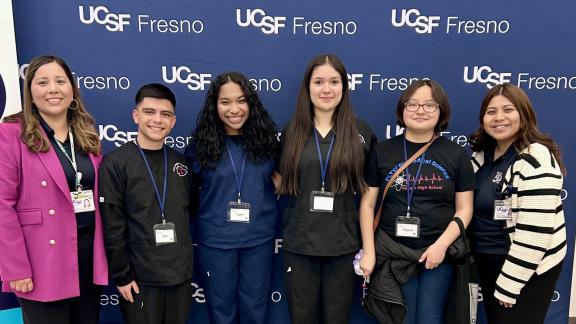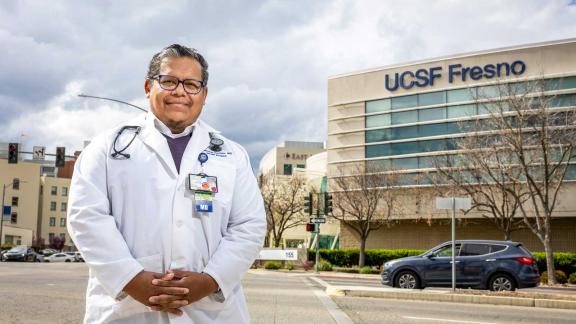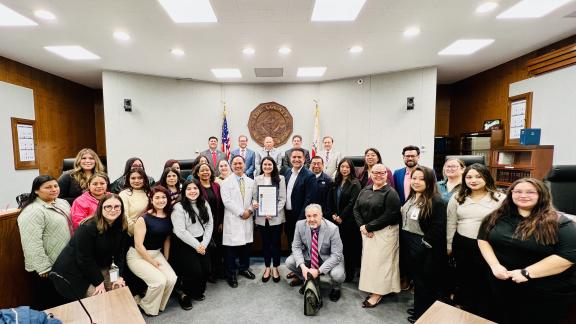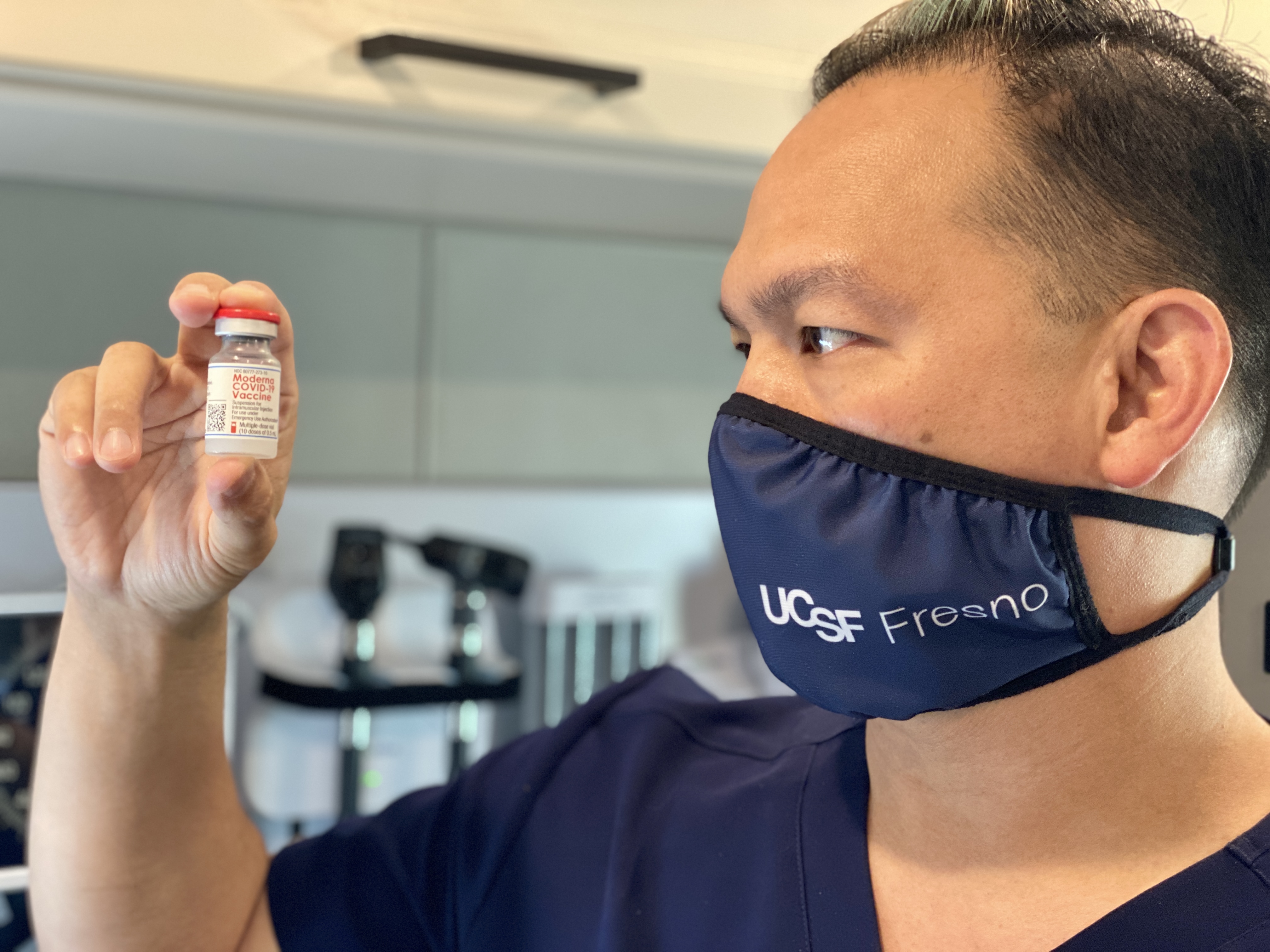
Driven by the coronavirus pandemic, the city of Fresno approached UCSF Fresno and community-based organizations with an urgent request last spring: provide free COVID-19 tests, outreach, contact tracing, social support – and ultimately vaccines -- for the most vulnerable and underserved populations in the city, especially people of color who are disproportionately sickened and hospitalized by the coronavirus.
By summer, with contracts signed and $5 million in federal CARES Act funding secured from the city, the UCSF Fresno COVID-19 Equity Project (CEP) launched as a drive-through, first-come, first-served testing service. The no-appointment model helps eliminate barriers to health access experienced most often by people of color, such as transportation constraints, limited English proficiency, and limited or no computer access.
UCSF Fresno purposely chose a no-appointment model of service, said Dr. Kenny Banh, UCSF Fresno assistant dean of undergraduate medical education and CEP medical director. “Studies that have looked at appointments versus walk-in systems show that in systems that did both, basically the appointment-based systems were almost always dominated by upper-income, Caucasian, non-minority patients who could navigate the system and had transportation and could arrange the time for an appointment. We really did not want to do an appointment system because it really didn’t fit the mission to serve the underserved and vulnerable population.”
More than a dozen community-based organizations (CBOs) spread the word about CEP, helping to build trust in communities with systemic inequities and longstanding mistrust of government and health care; and the public embraced the project from its first days in September when it began COVID-19 testing. Over a period of seven months, CEP has given more than 23,000 COVID-19 tests; and of those tested, 80% have identified as people of color. CEP has administered at least 13,000 vaccine inoculations and a recent sample of nearly 6,000 of those revealed 69% identified as people of color.
“This project is a good example of what it really means to invest in equity,” said Christine Barker, executive director of Fresno Interdenominational Refugee Ministries (FIRM), a faith-based nonprofit serving primarily refugees of Hmong, Laotian, Slavic, African and Syrian communities. CEP provides services at no cost to patients, including people with Medi-Cal and uninsured. “We never collect a dollar for a single piece of service, and we don’t ever want to,” Banh said.
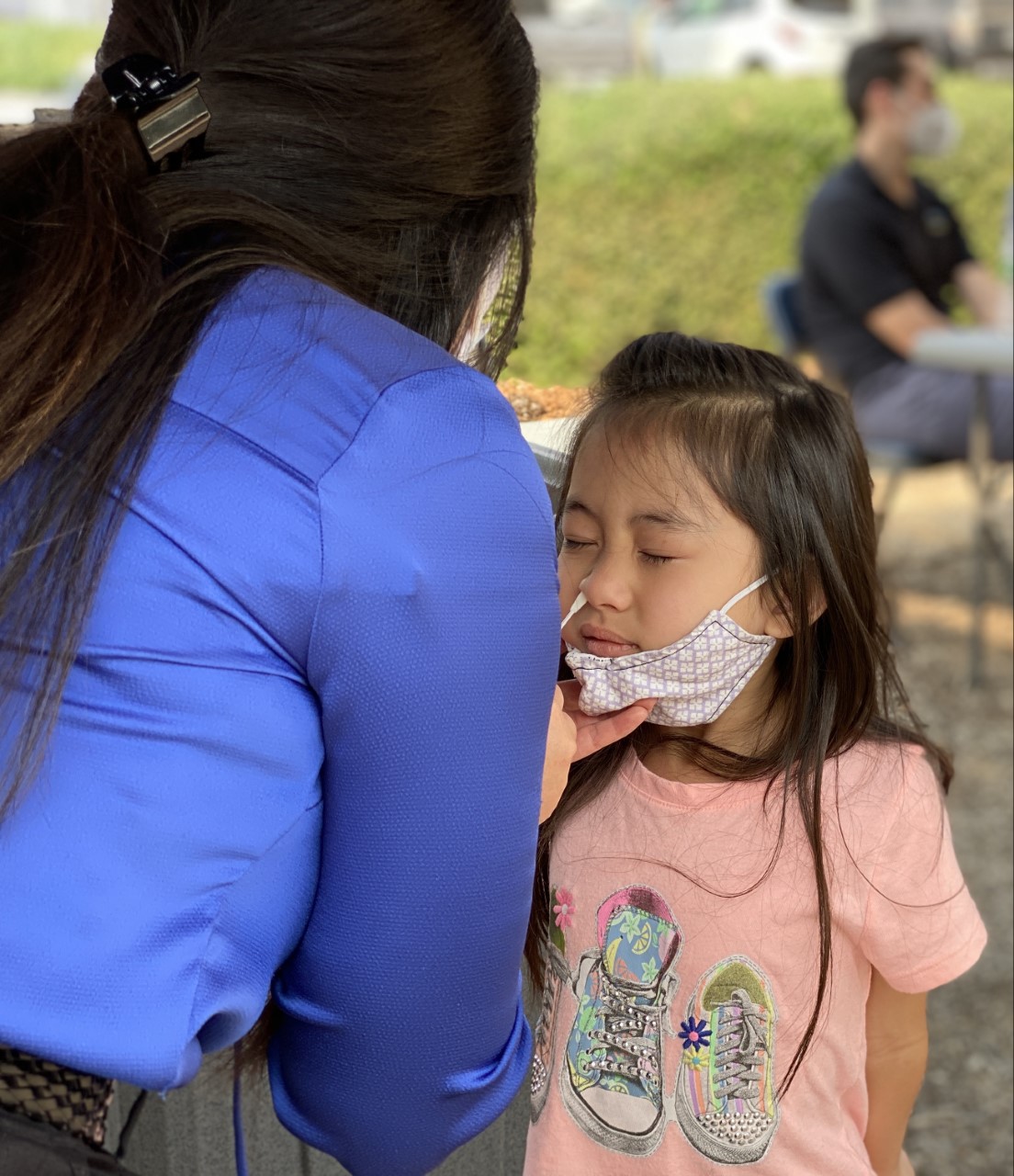
Testing is provided to the homeless at Poverello House in Fresno and CEP also holds regularly scheduled mobile testing clinics at the Consulate of Mexico, Asian Village, First 5 Fresno County, UC Merced Fresno Center and FIRM. In September, CEP set up a static site at FIRM on Weldon Avenue in central Fresno, and within weeks, patients waited inside cars that stretched for more than two miles on clinic days. In early January, amid a COVID-19 surge and heightened demand for testing, CEP moved to a larger space at the UC Merced Fresno Center on East Shaw Avenue. When vaccines for COVID-19 became available, up to 500 people a day came for Moderna and Pfizer vaccine injections, quickly exceeding capacity at the location. In partnership with the Fresno County Department of Public Health and Fresno City College, CEP moved on March 22 to the FCC campus, where parking-lot space allows for a mass vaccination site.
FOLLOWING PATH PAVED BY HEAL
UCSF Fresno, a regional campus of UCSF, was uniquely positioned to quickly begin COVID-19 testing and vaccine injections. In 2018, Dr. Banh started a mobile health service for the central San Joaquin Valley. UCSF Fresno’s Mobile Health and Learning (HeaL) provides flu shots and health screenings for patients while providing learning opportunities for medical students and pre-health students under the guidance of medical residents and faculty physicians. In addition to training physicians and teaching medical students and providing clinical and volunteer experiences for pre-health students, UCSF Fresno is committed to improving the health of the San Joaquin Valley, and Mobile HeaL and now CEP are means of providing needed care outside of hospital and clinic walls, said UCSF Fresno Associate Dean Dr. Michael W. Peterson.
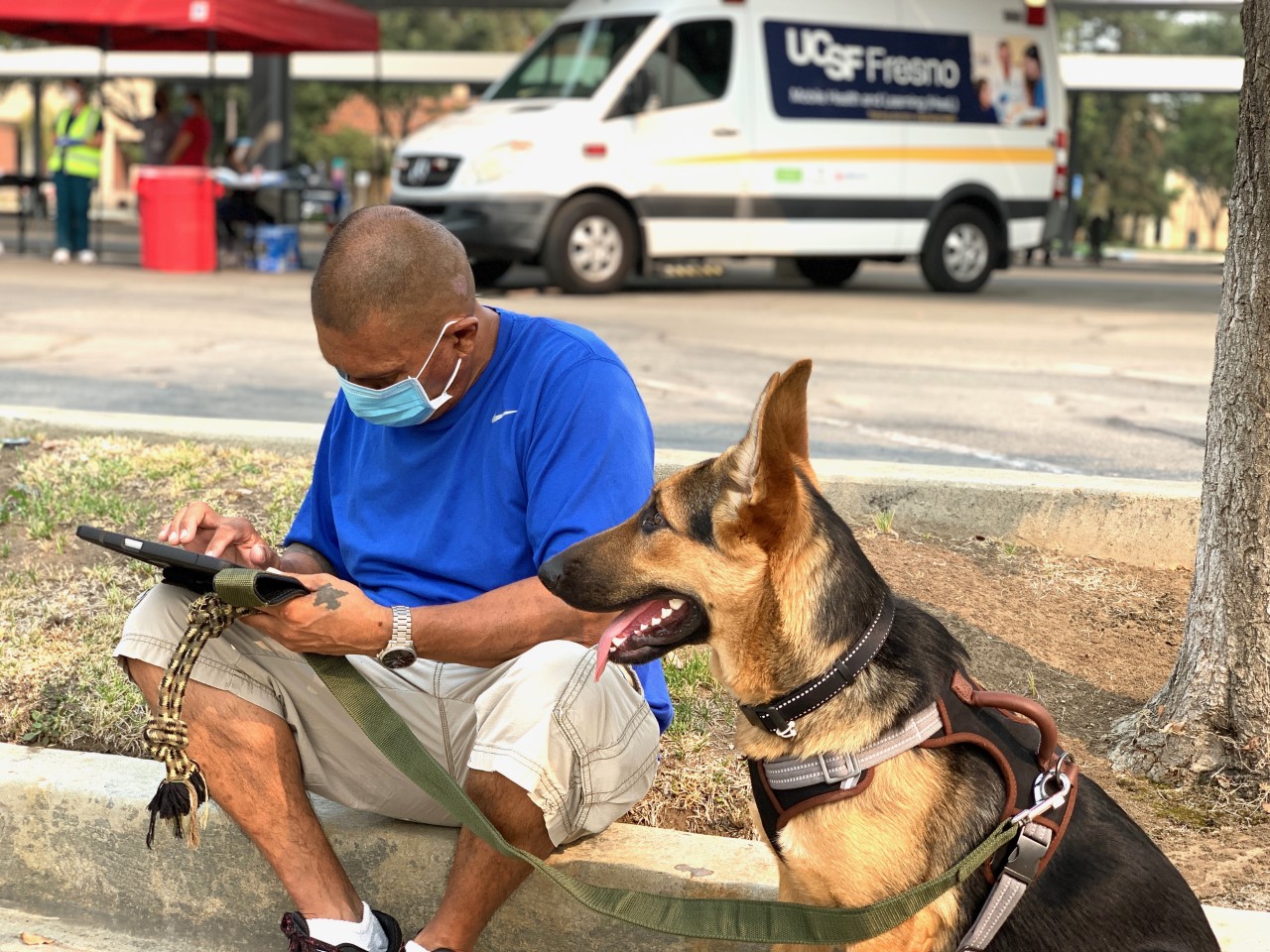
CEP has greatly strengthened UCSF Fresno’s alliances in the community, Peterson said. “In order to really try to achieve our goal of improving the health of the community, we cannot do that alone,” he said. “We have to do that by engaging with community-based organizations and the community as a whole about how to provide preventative services and how we help support the work they are doing in the community so that we’re really impacting the health of people before they get sick and need to see a doctor.”
Fresno City Councilmember Esmeralda Soria has been a supporter of CEP and advocated for the allocation of $5 million from the CARES Act for the project. “I have always highlighted the need that exists for health services in our underserved areas,” Soria said. “We have sadly witnessed the detrimental effects this pandemic has had in these communities. ... The COVID Equity Project has proven to be successful in providing COVID testing, contact tracing, community outreach, and now much-needed COVID-19 vaccines.”
Likewise, Fresno City Councilmember Miguel Arias said, “the city of Fresno is privileged to partner with a trusted community provider like UCSF Fresno, to ensure we are meeting the needs of our most vulnerable communities during this pandemic.”
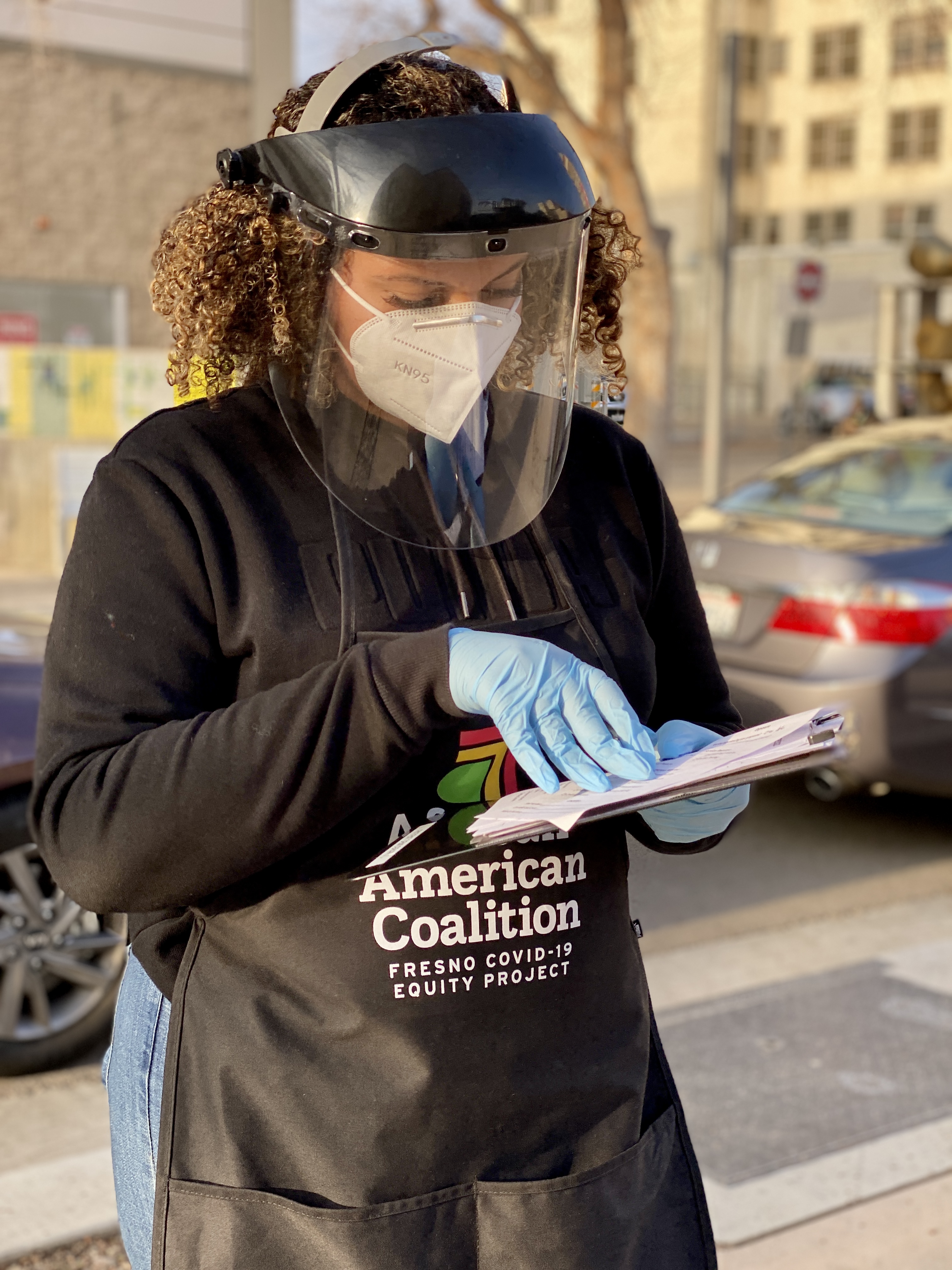
The partnership with CBOs has been immeasurable to the success of the project. The organizations, which represent numerous communities in Fresno, include: African American Clergy Taskforce, Black Wellness & Prosperity Center, Central Valley Health Policy Institute, Centro Binacional para el Desarrollo Indígena Oaxoqueño, Centro La Familia, Cultiva La Salud, Cultural Brokers Inc., Fresno Building Healthy Communities, The Fresno Center, Fresno Economic Opportunities Commission, Fresno Interdenominational Refugee Ministries, Fresno Black Metro Chamber of Commerce, Go Public Schools Fresno, Jakara Movement, Reading and Beyond, Take a Stand Committee and West Fresno Family Resource Center. Some of these organizations make up the Immigrant Refugee Coalition, the African American Coalition and the Disability Equity Project, which implement COVID-19 equity projects in tandem and focus on specific underserved populations in Fresno County.
EASING PATIENT FEARS
Juanita Sprowell, CEP operations specialist, has seen firsthand the benefits of working closely with members of community-based organizations. When the pandemic started last March, patients in vulnerable communities were scared to receive positive coronavirus test results for fear of losing jobs and the ability to feed and house their families. “They were scared what their results would be because they didn’t have the social support to deal with a positive test,” Sprowell said. The CBOs provide that support, which has reduced the stigma and fear of getting tested and of having a positive test.
CEP Clinical Manager Jolene Woods, a registered nurse, said the CBOs have built trust with the patients, as well as providing help. “If you don’t have trust, they’re not going to access the care anyway,” she said. Many of the UCSF Fresno staff are fluent in languages other than English, but the CBOs have provided invaluable help with translators, Sprowell said. “When we’re able to just say, ‘Just one moment, we’ll get a translator,’ their faces light up because they automatically feel more comfortable,” she said. “It’s the foundation of trust to be able to effectively communicate.”
Tania Pacheco-Werner, co-director of the Central Valley Health Policy Institute at Fresno State, said CEP has shown “vaccine hesitation is not an issue with our most vulnerable in this community – it’s just access.”
Outreach and education are essential, particularly in the African American community where people have not necessarily had good relationships with the health care system, said Heather M. Brown, chief administrative officer at Fresno Economic Opportunities Commission. “The real value is having both people in the community talking about the vaccine, answering questions about the vaccine and really honoring vaccine hesitancy, acknowledging historical problems that the African American community has had.”
TRANSLATION SERVICES AND MORE
Funding from the city and county for CBOs to be able to provide language translation and outreach, among other services, has been essential, Barker of FIRM said. “The city investment for the COVID-19 Equity Project for the CBOs and the county investment for the CBOs has really enabled us to be partners in this project and ensure equity in how we operated and how we did it, and really the implementation of it, too.”
“For the Southeast Asian community, it was really important to offer testing in familiar and accessible locations,” Barker said. “We saw that once UCSF Fresno started testing at FIRM, the number of Asian positive tests started to grow. That tells me that before UCSF Fresno was testing at FIRM, Southeast Asians were not going to be tested anywhere. We were able to find positive cases that others were not able to catch in our community.”
The Jakara Movement, which serves the Punjabi Sikh community in Fresno, has worked to dispel misinformation and rumors about COVID-19, said Preet Singh Grewal, the CEP project manager at Jakara Movement. “We have used our own platform to not only share what the city and county were sharing and the CDC guidelines translating into Punjabi, but we have provided them in a very easily understandable way,” he said. “Dr. Banh is a very helpful resource. He has made himself available to help our coalition.” Many of the Jakara staff are pre-med students or pre-nursing students and “they have taken so much away from Dr. Banh’s leadership,” Grewal said. “They have a greater idea of what goes on in family medicine and gained personal skills in working with patients, with clients with different ethnicities.”
TRAINING, RETAINING FUTURE HEALTH-CARE WORKERS
UCSF Fresno’s mission not only is to provide high-quality health care but also to train the next generation of physicians for the San Joaquin Valley. Working at CEP has influenced several staff to consider the pursuit of careers in health or to return to school for higher degrees in health care fields.
Alex Chavez, 25, a CEP medical clerk, is the son of farmworkers and is the first in his family to receive a college degree. He started volunteering on UCSF Fresno’s Mobile HeaL in 2018. He attended classes at Fresno City College, graduated with an associate degree from Clovis Community College and graduated from Fresno State in 2019 with a bachelor’s degree in biology. He is studying for the Medical College Admission Test and expanding his clinical and medical and leadership experiences. His career goal is to become a physician and eventually come back to the Valley to serve his community. Chavez is fluent in English, Spanish and Italian.
Chavez said CEP has helped him understand underserved populations, such as the Laotian and African American communities. “I have learned that many of the patients don’t have the ability to get health care. It’s opened my eyes to return to my home and advocate for those patients who don’t have the ability to advocate for themselves and provide the health care that they deserve.” Mackenzie Saephanh, 21, who is Mobile HeaL co-director of outreach, volunteer coordinator and medical clerk, said her experiences at CEP have given her a new appreciation for the Valley. “I’ve grown a deeper love for the area I was born and raised in and how diverse and how closely knit everyone is here, too – in the community and in CEP.” Saephanh is a pre-med major at Fresno State and is a first-generation college student.
Damien Ruiz and September Ruiz are traveling licensed vocational nurses from Los Angeles who have been working at CEP. Damien Ruiz said the couple may stay in Fresno and pursue RN degrees. “We just fell in love with what we are doing here,” he said. “A lot of our clients are super grateful to the point where not only do they verbalize it with us, but we get gifts of doughnuts and pizza and coffee.”
UCSF Fresno consciously looks to hire people from the Valley who are representative of the patients being served, Dr. Banh said. “We want to get people who come from disadvantaged backgrounds, people who are underrepresented. And, as we are serving communities of color, we want to make sure we have language access and the staff to represent the communities that we were treating.” Hiring from the community also is a way to address health inequities, he said. “If you’re not doing some active part to address inequity, you’re part of the problem. This is not just about being trusted, this is actually about serving the community.”
CEP Medical Assistant Vanessa Lopez-Jimenez can identify with the people she is helping. “I grew up with a struggle,” she said, wiping a tear as she explained: “My mother didn’t have resources, she was always needing help as a single mother of five kids.” Lopez-Jimenez, who is fluent in Spanish, said patients are grateful when she talks with them in the language they are most comfortable speaking. “It makes me feel good, especially when they say that they love us,” she said. “One day there was a patient I was observing, and he said, ‘You guys are angels. We love you. And you remind me so much of my granddaughter.’” Lopez-Jimenez said she replied, “if it wasn’t for COVID, I would give you a hug.”
Corina Jefferson, a CEP medical assistant, said the patients feel like this is a privilege for them. “A lot of them are farmworkers or people who are undocumented or people who don’t have insurance. It’s good to help those who cannot get help.”
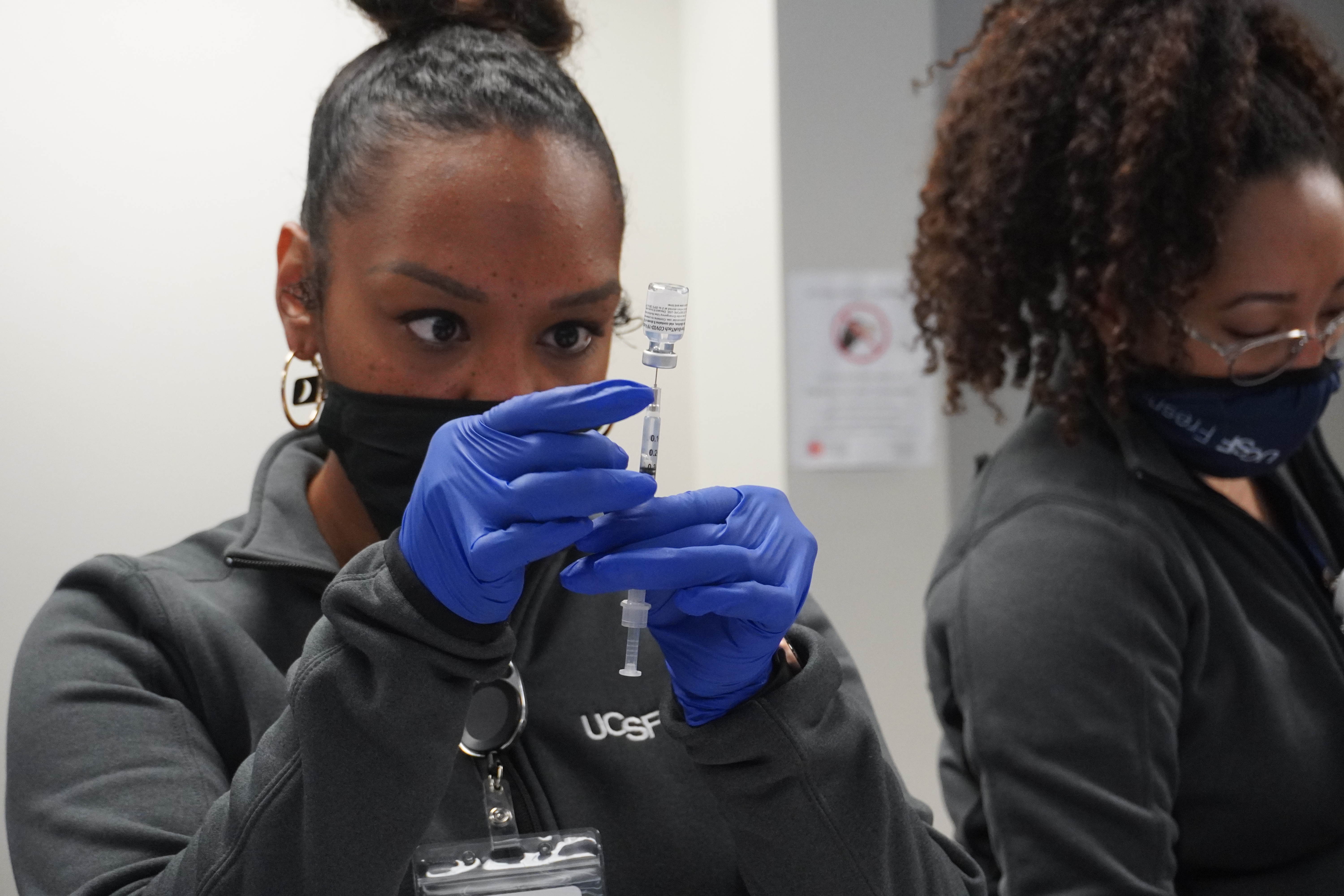 RELATIONSHIPS BUILT ON TRUST
RELATIONSHIPS BUILT ON TRUST
Every week, CEP workers arrive at Poverello House in downtown Fresno to provide testing to the unsheltered and needy, and Zachary D. Darrah, chief executive officer at Poverello House, is thankful. “We’re not a medical service provider, we are a support service and shelter provider and a food provider for those of need in our community,” Darrah said. “So there was a layer to COVID response that Poverello House is just not suited to be able to provide to the community.”
“To have these services accessible in a place that’s trusted by the community, by those experiencing homelessness, is a really big deal to access,” Darrah said. “And it’s also been an asset to our shelter services because doing congregate shelter is a particular risk during the time of COVID. We’ve been able to manage that risk through many partners but testing with UCSF Fresno is part of that response and that ability to provide those services.”
Through CEP, relationships have been built with CBOs and local and regional government, Dr. Peterson said. “Hopefully, we can be recognized by them in the future as a partner in working to address some of the things that they are constantly trying to deal with at the county and city level in terms of access to care,” he said.
“This is one of the silver linings of COVID-19 – we developed new partnerships to help our community respond to the pandemic. Together, we showed determination, collaboration and resiliency. And we are better for it as a community and my hope is that this spirit of partnership around diversity, equity and inclusiveness continues in the future.”
Barbara Anderson is a communications specialist at UCSF Fresno. She formerly reported on health issues for The Fresno Bee.

